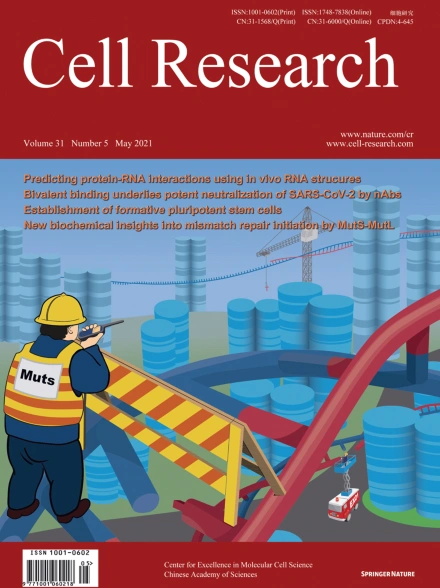
Advanced Search
Submit Manuscript
Advanced Search
Submit Manuscript
Volume 31, No 5, May 2021
ISSN: 1001-0602
EISSN: 1748-7838 2018
impact factor 17.848*
(Clarivate Analytics, 2019)
Volume 31 Issue 5, May 2021: 597-600 |
Structure-based development of three- and four-antibody cocktails against SARS-CoV-2 via multiple mechanisms
Yao Sun1 , Lei Wang1,2 , Rui Feng1,2 , Nan Wang1,2 , Yuxi Wang3 , Dandan Zhu1 , Xiaorui Xing1 , Peng Yang1,2 , Yanjun Zhang4,* , Weimin Li3,* , Xiangxi Wang1,2,5,*
1CAS Key Laboratory of Infection and Immunity, National Laboratory of Macromolecules, Institute of Biophysics, Chinese Academy of Sciences, Beijing 100101, ChinaDear Editor,
The ongoing coronavirus disease 2019 (COVID-19) pandemic caused by severe acute respiratory syndrome coronavirus-2 (SARS-CoV-2) has resulted in an unprecedented public health crisis, galvanizing a global effort for rapidly developing new therapeutic strategies effective against COVID-19. Human monoclonal antibodies (mAbs) are promising therapeutic molecules that can be used for the prevention or treatment of viral infectious diseases, including COVID-19. For instance, ZMappTM, a cocktail consisting of three different mAbs targeting the Ebola glycoprotein is one of the most successful antibody-based therapeutic for treating infections caused by Ebola virus.1 Notably, this cocktail combines the best-performing neutralizing antibodies (NAbs) screened and developed using two separate approaches, one from humanized antibodies of origin and the other from human survivors. The success of these methods indicates critical roles played by NAb diversity in the design of antibody cocktails. Cocktail therapies are not only a source of ultra-potent neutralizing activities, but they also offer advantage in overcoming potential drug resistance issues arising out of the rapid mutation of viral pathogens, in particular when selective pressure is applied. Concerningly, the emerged and rapidly spreading SARS-CoV-2 variants have arisen in the United Kingdom (UK), South Africa (SA) and other regions, such as more recently reported B.1.1.7 (UK strain, variant of concern, VOC202012/01) and 501Y.V2 (SA strain, VOC501Y.V2). These variants contain multiple mutations in their spike proteins (S), some of which are key targets of NAbs, highlighting the tremendous potential of multiple antibody-based cocktails in treating SARS-CoV-2 infection.
https://doi.org/10.1038/s41422-021-00497-7